Major Henry Charles David Marshall - Wallet 1 - Booklet 5 - Part 2
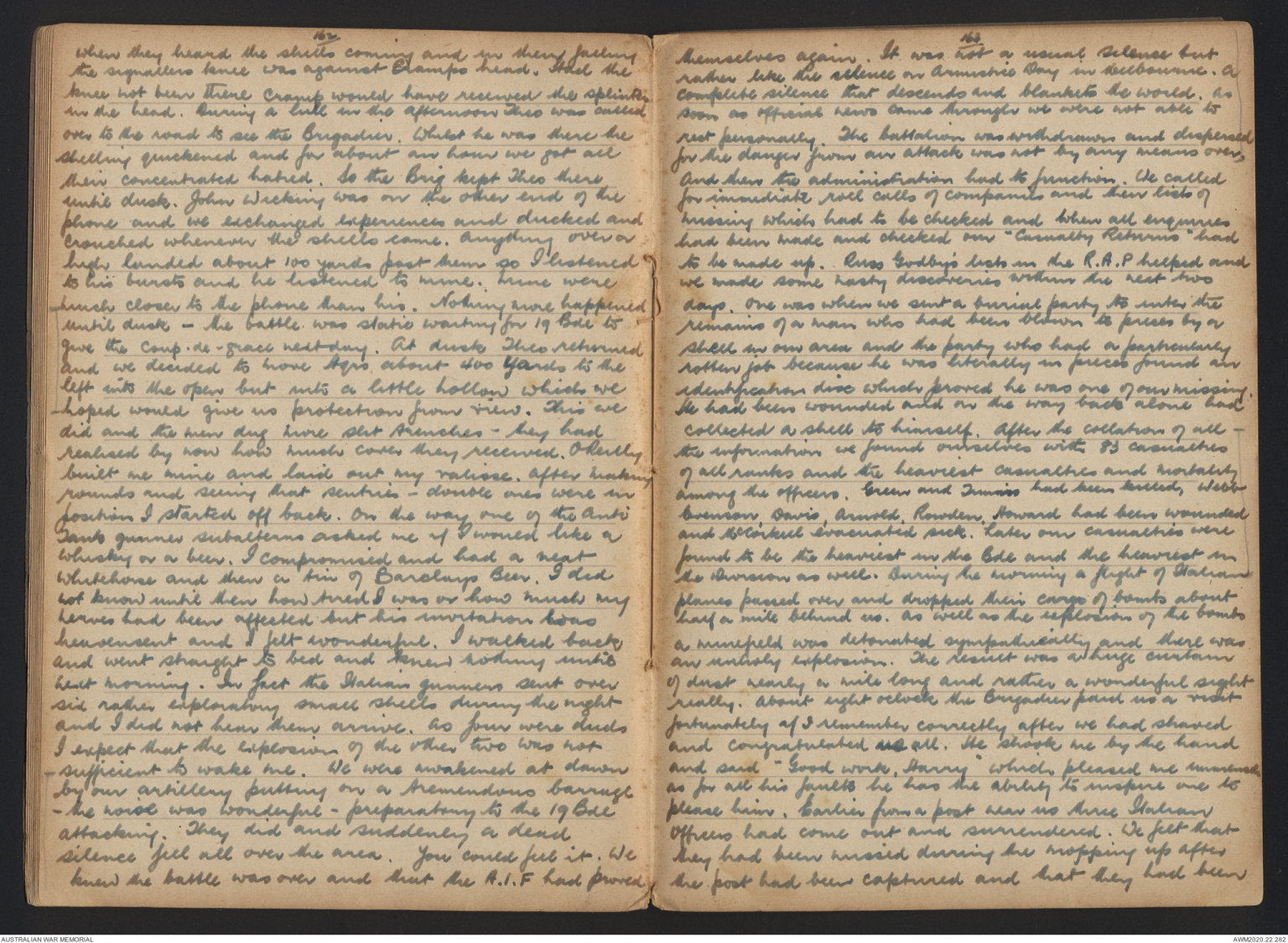
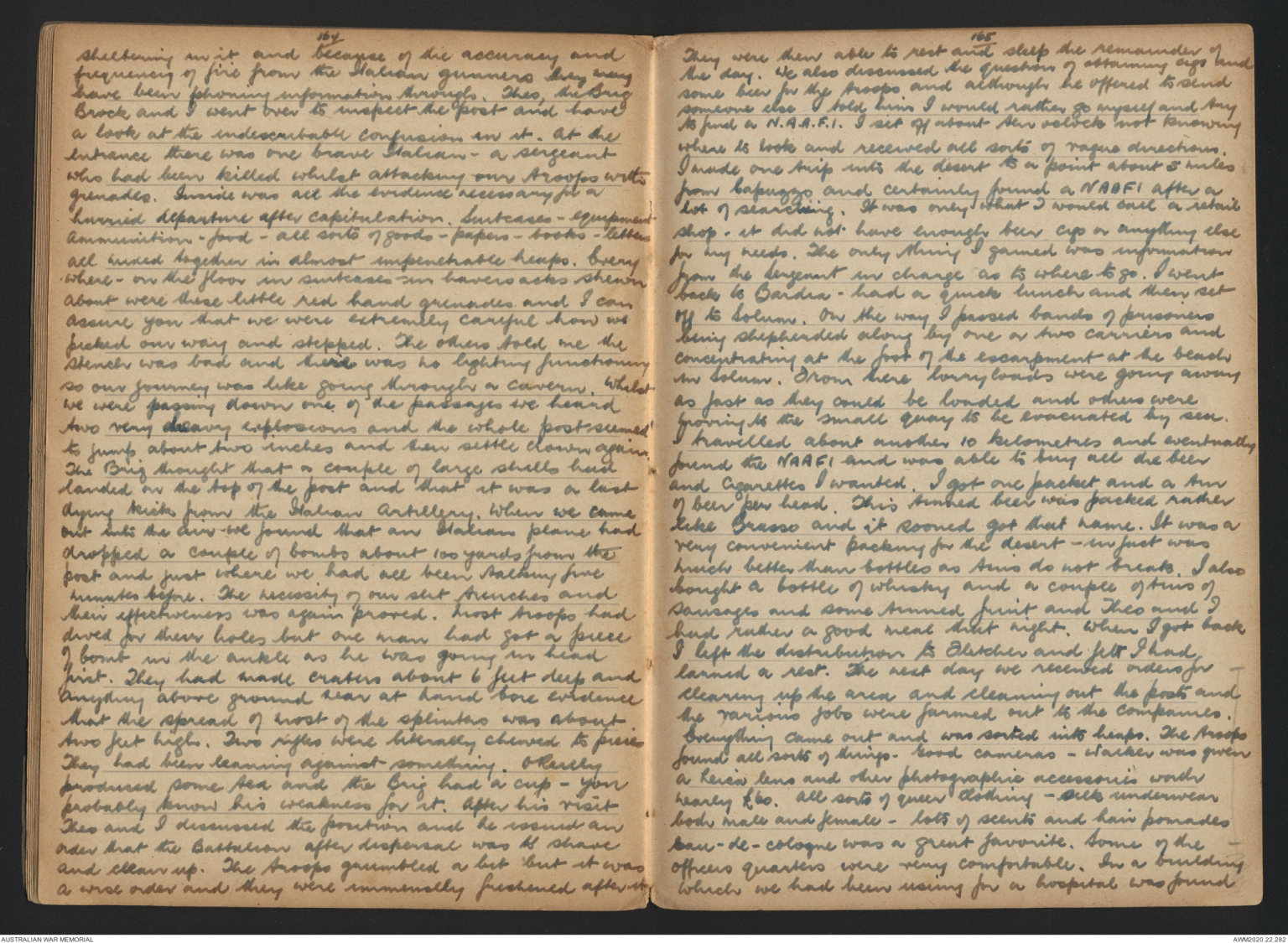
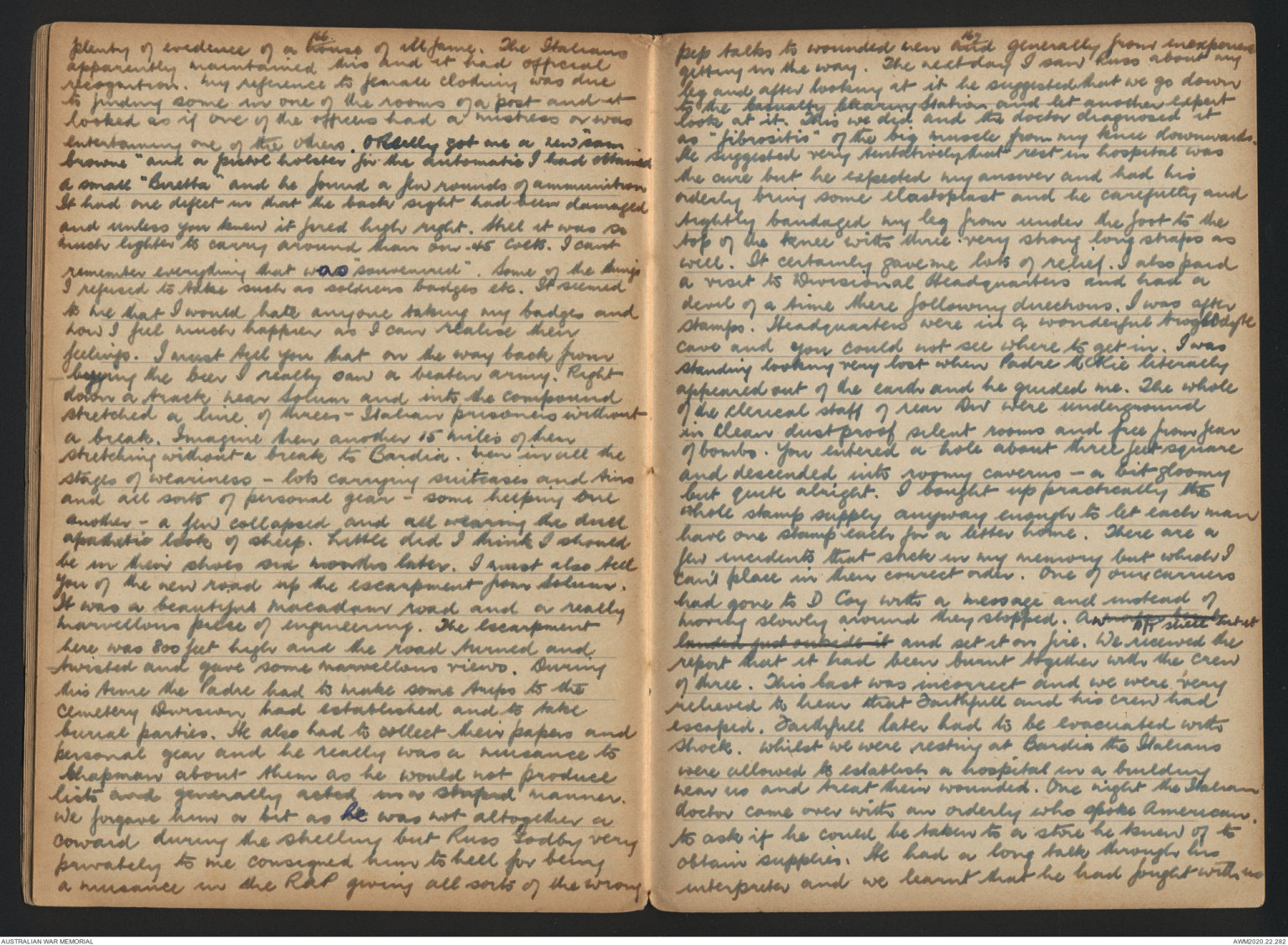
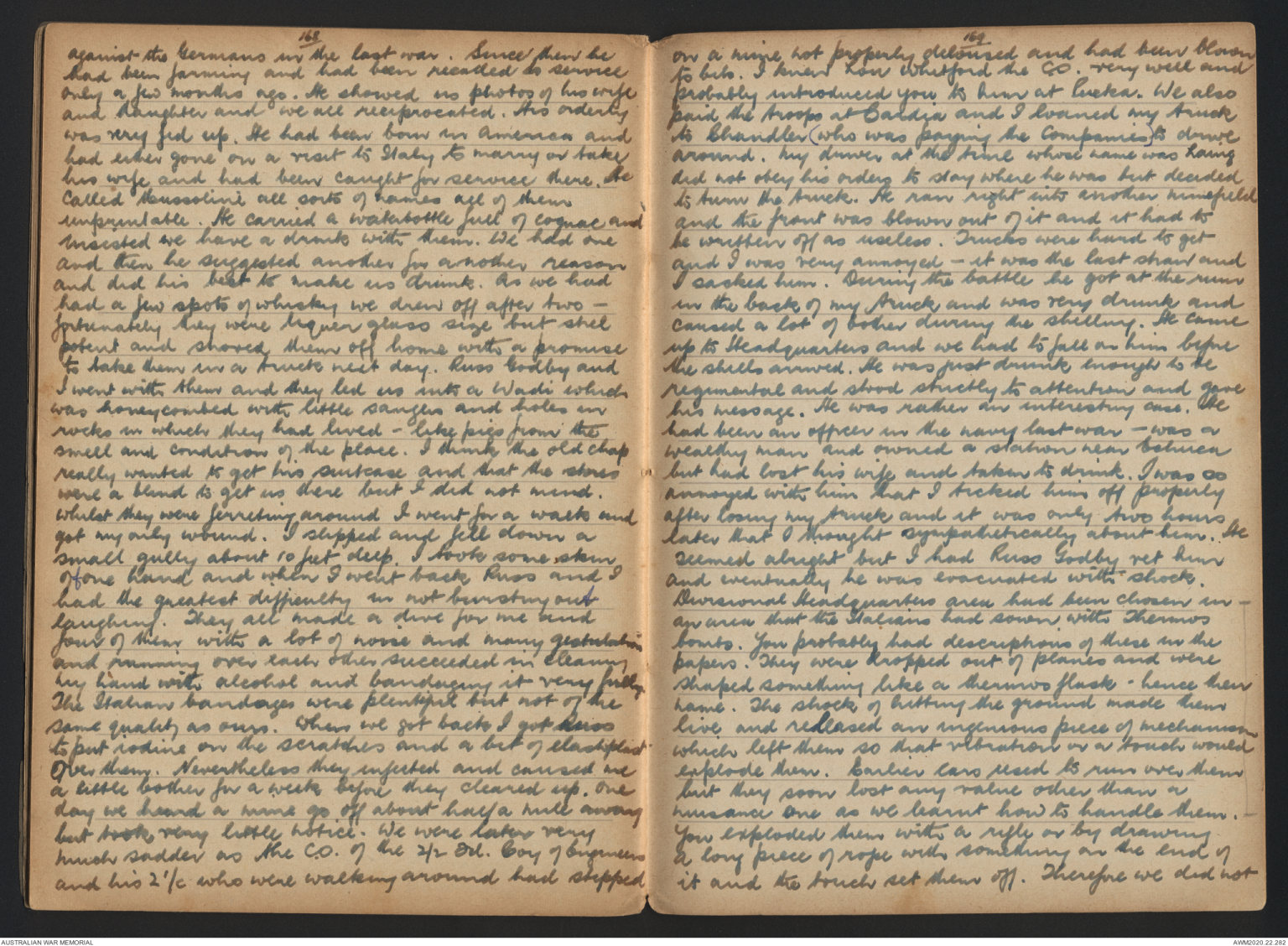
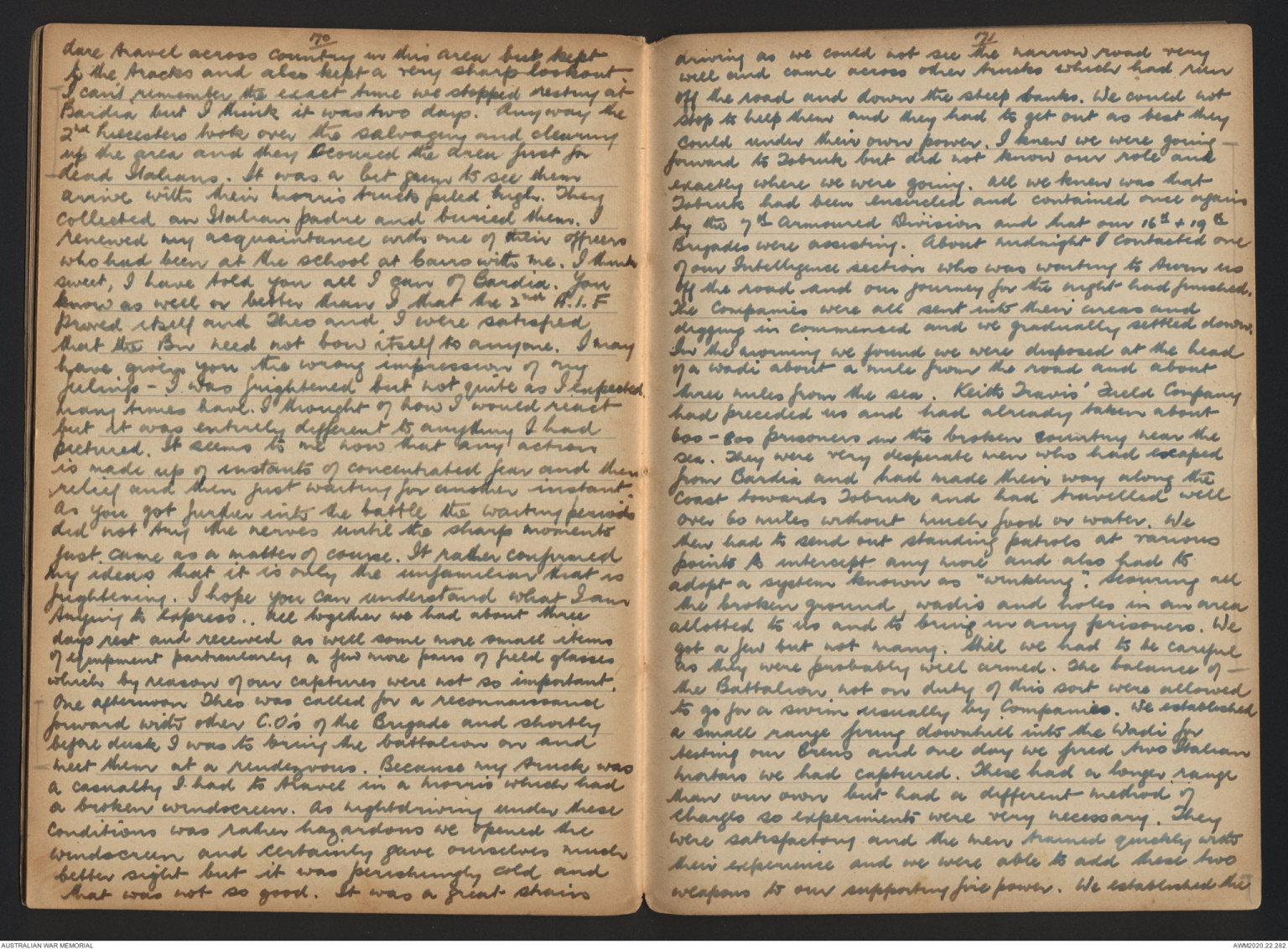
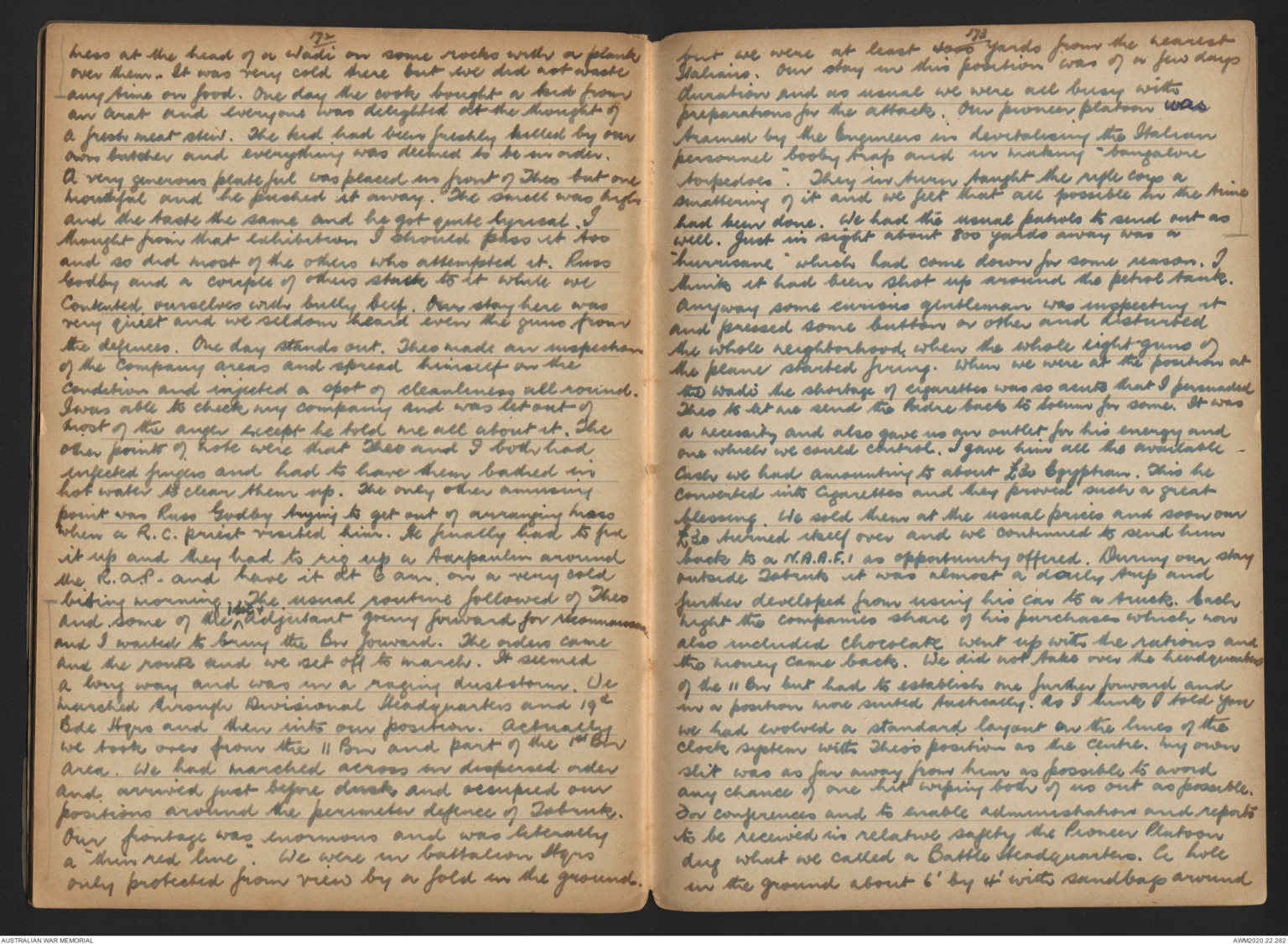
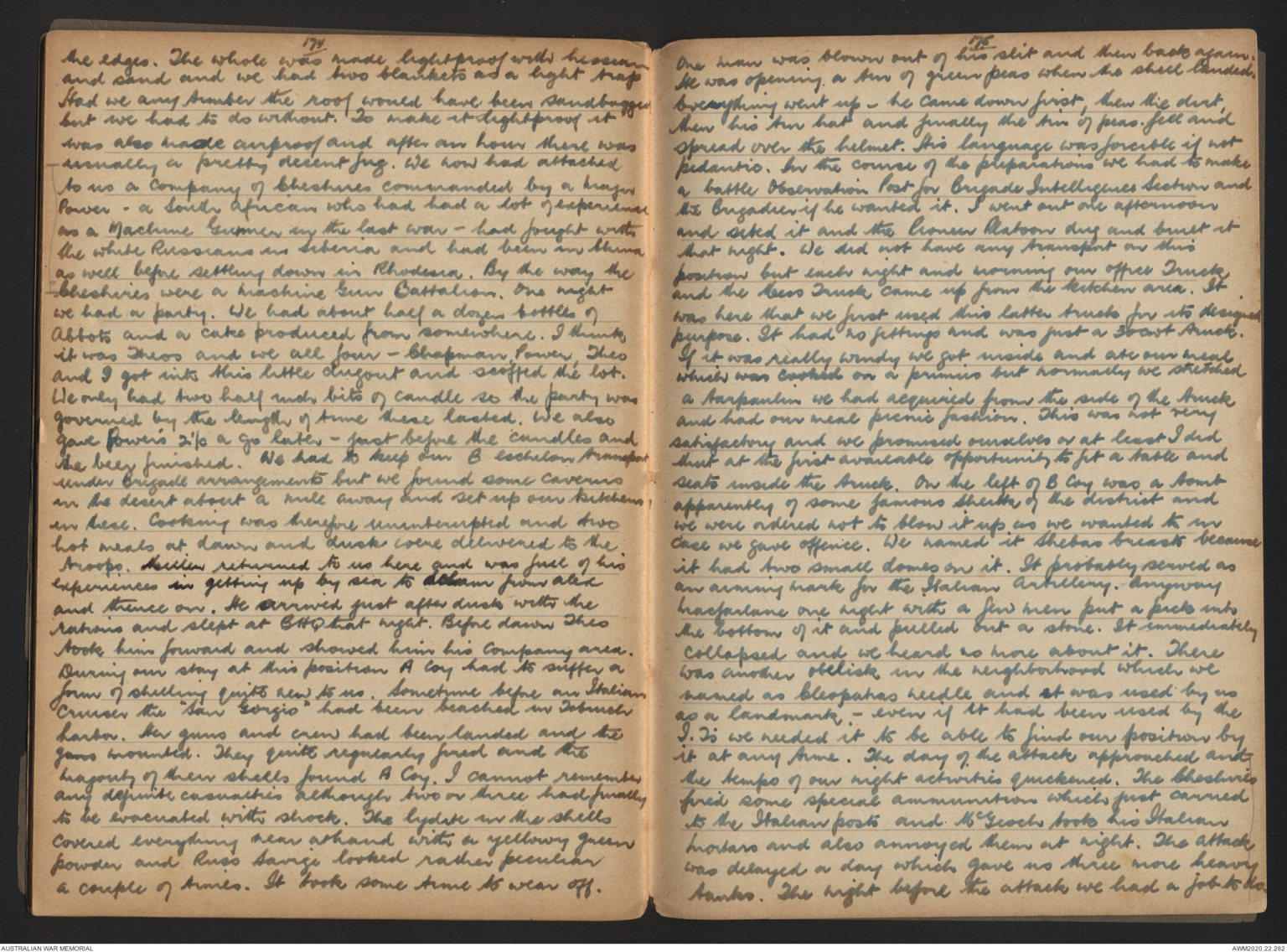
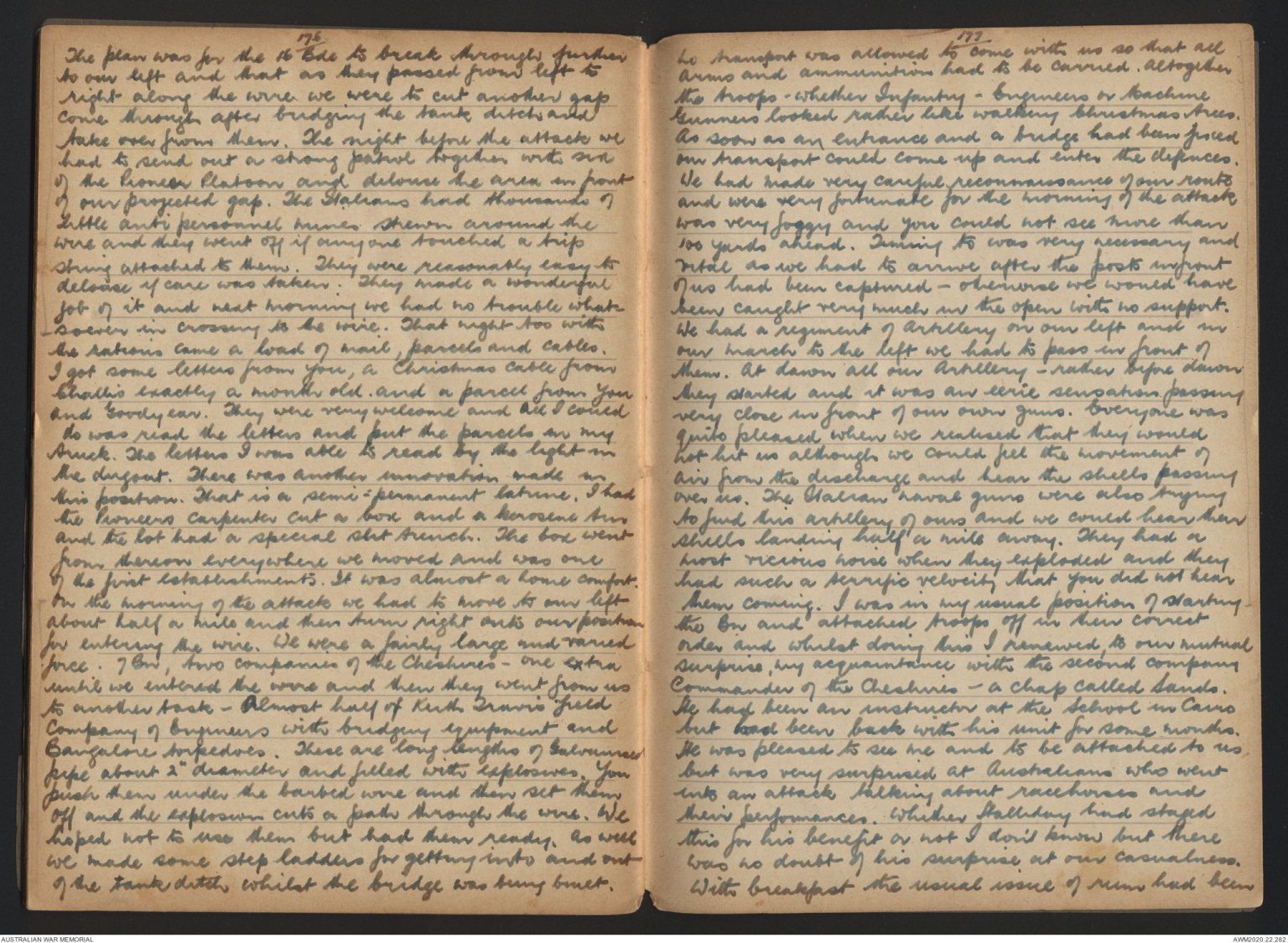
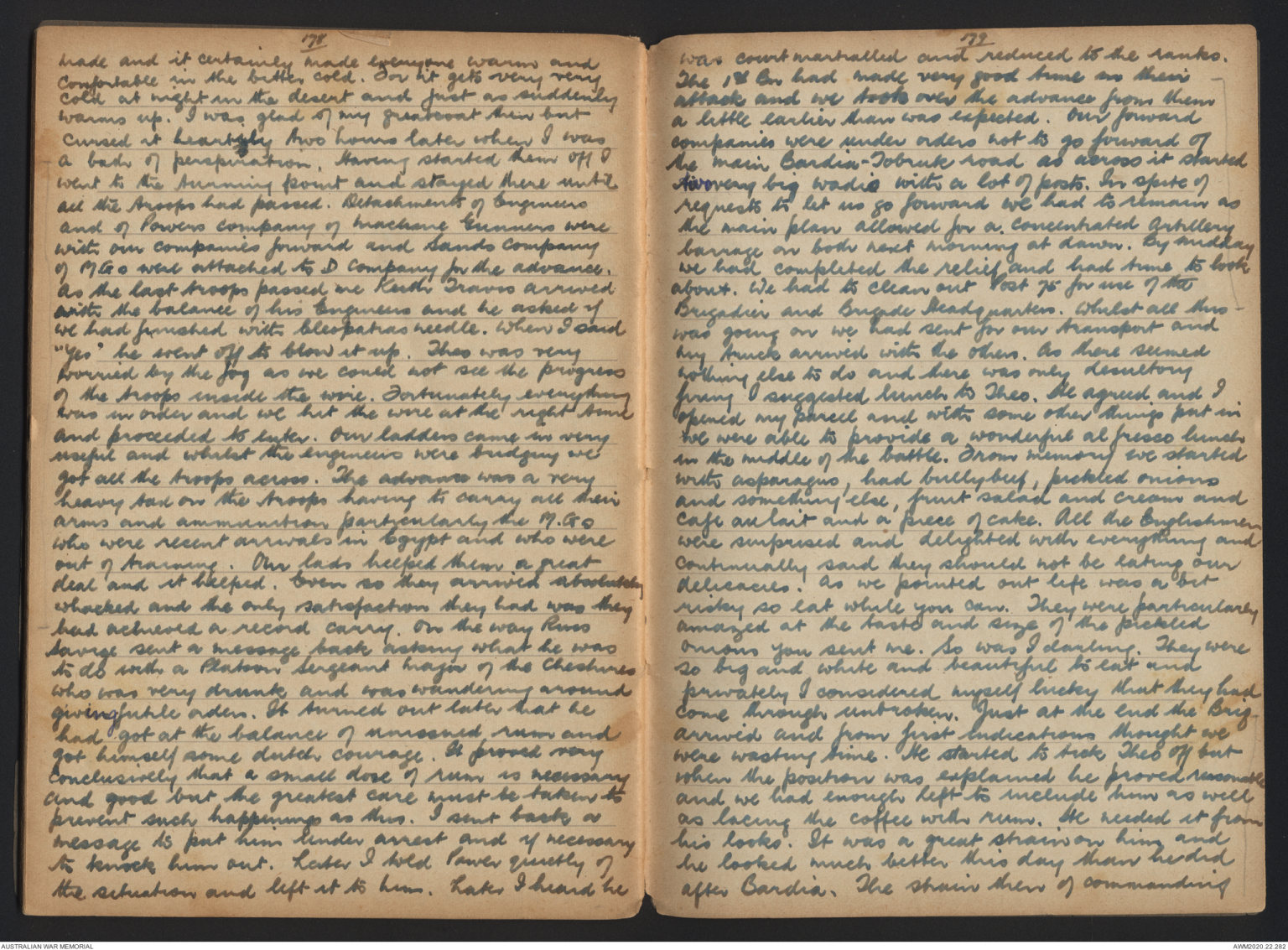
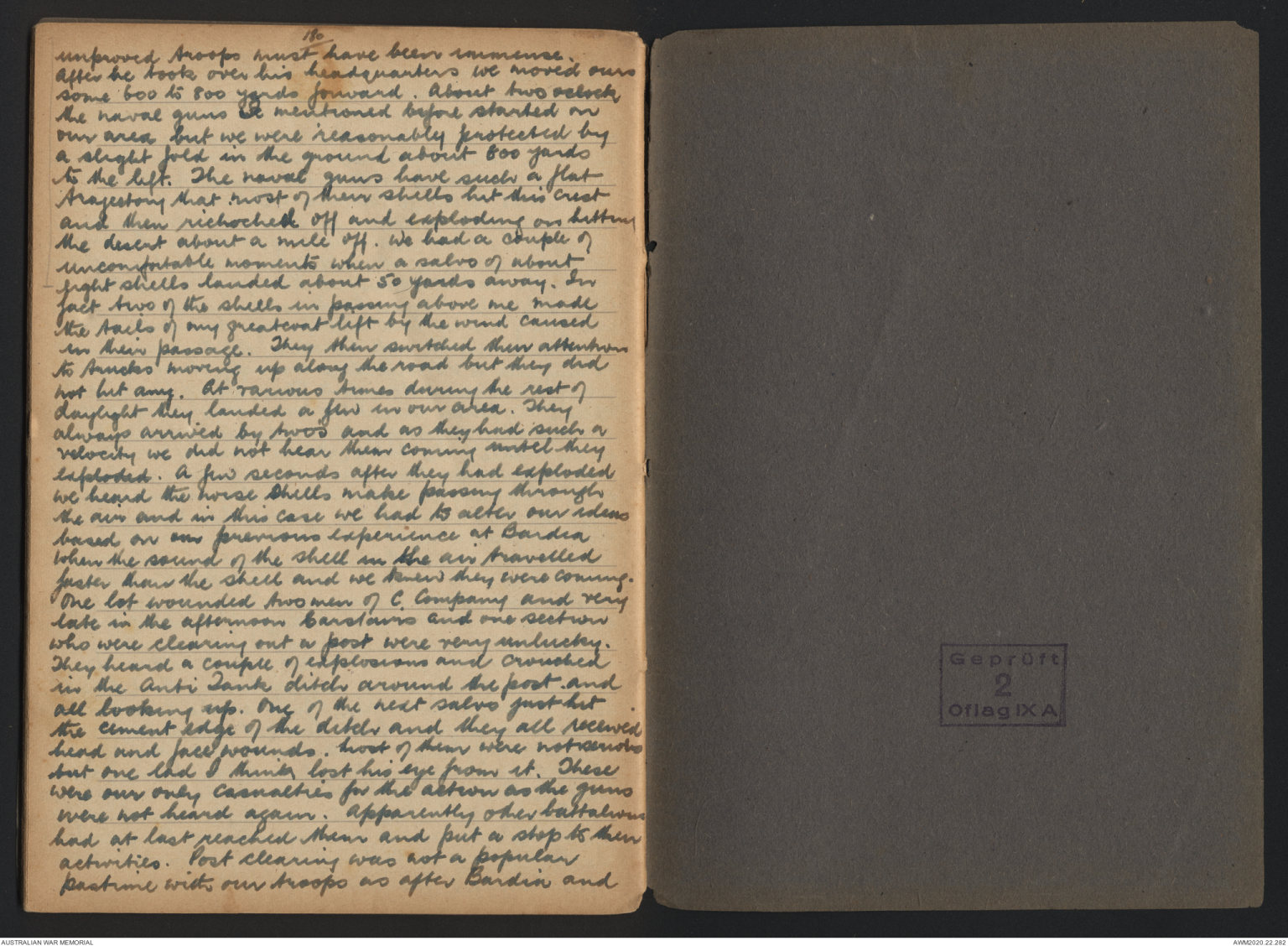
162
when they heard the shells coming and in them falling
the signallers lance was against Cramps head. Had the
knee not been there Cramp would have received the splinter
in the head. During a lull in the afternoon Theo was called
over to the road to see the Brigadier. Whilst he was there the
shelling quickened and for about an hour we got all
their concentrated hatred. So the Brig kept Theo there
until dusk. John Wicking was on the other end of the
phone and we exchanged experiences and ducked and
crouched whenever the shells came. Anything over or
high landed about 100 yards past them so I listened
to his bursts and he listened to mine. Mine were
much closer to the phone than his. Nothing more happened
until dusk - the battle was static waiting for 19 Bde to
give the coup.de-grace next day. At dusk Theo returned
and we decided to move Hqrs about 400 yards to the
left into the open but into a little hollow which we
hoped would give us protection from view. This we
did and the men dug more slit trenches - they had
realised by now how much cover they received. OReilly
built me mine and laid out my valisse. After making
rounds and seeing that sentries - double ones were in
position I started off back. On the way one of the Anti
Tank gunner subalterns asked me if I would like a
whisky or a beer. I compromised and had a neat
Whitehorse and then a tin of Barclays Beer. I did
not know until then how tired I was or how much my
nerves had been affected but his invitation was
heavensent and I felt wonderful. I walked back
and went straight to bed and knew nothing until
next morning. In fact the Italian gunners sent over
six rather exploratory small shells during the night
and I did not hear them arrive. As four were duds
I expect that the explosion of the other two was not
sufficient to wake me. We were awakened at dawn
by our artillery putting on a tremendous barrage
- the noise was wonderful - preparatory to the 19 Bde
attacking. They did and suddenly a dead
silence fell all over the area. You could feel it. We
knew the battle was over and that the A.I.F. had proved
163
themselves again. It was not a usual silence but
rather like the silence on Armistice Day in Melbourne. A
complete silence that descends and blankets the world. As
soon as official news came through we were not able to
rest personally. The Battalion was withdrawn and dispersed
for the danger from an attack was not by any means over,
and then the administration had to function. We called
for immediate roll calls of companies and their lists of
missing which had to be checked and when all enquiries
had been made and checked our "Casualty Returns" had
to be made up. Russ Godby's lists in the R.A.P. helped and
we made some nasty discoveries within the next two
days. One was when we sent a burial party to inter the
remains of a man who had been blown to pieces by a
shell in our area and the party who had a particularly
rotten job because he was literally in pieces found an
identification disc which proved he was one of our missing.
He had been wounded and on the way back alone had
collected a shell to himself. After the collation of all
the information we found ourselves with 83 casualties
of all ranks and the heaviest casualties and mortality
among the officers. Green and Timmins had been killed, Webb
Evenson, Davis, Arnold, Rowden, Howard had been wounded
and McCorkill evacuated sick. Later our casualties were
found to be the heaviest in the Bde and the heaviest in
the Division as well. During the morning a flight of Italian
planes passed over and dropped their cargo of bombs about
half a mile behind us. As well as the explosion of the bombs
a minefield was detonated sympathetically and there was
an unholy explosion. The result was a huge curtain
of dust nearly a mile long and rather a wonderful sight
really. About eight oclock the Brigadier paid us a visit
fortunately af I remember correctly after we had shaved
and congratulated us all. He shook me by the hand
and said - Good work, Harry" which pleased me immensely
as for all his faults he has the ability to inspire me to
please him. Earlier from a post near us three Italian
Officers had come out and surrendered. We felt that
they had been missed during the mopping up after
the post had been captured and that they had been
164
sheltering in it and because of the accuracy and
frequency of fire from the Italian gunners they may
have been phoning information through. Theo, the Brig
Brock and I went over to inspect the post and have
a look at the indescribable confusion in it. At the
entrance there was one brave Italian - a sergeant
who had been killed whilst attacking our troops with
grenades. Inside was all the evidence necessary for a
hurried departure after capitulation. Suitcases - equipment
Ammunition - food -all sorts of goods - papers - books - letters
all mixed together in almost impenetrable heaps. Every
where - on the floor in suitcases - in haversacks strewn
about were these little red hand grenades and I can
assure you that we were extremely careful how we
picked our way and stepped. The others told me the
stench was bad and there was no lighting functioning
so our journey was like going through a cavern. Whilst
we were passing down one of the passages we heard
two very heavy explosions and the whole post seemed
to jump about two inches and then settle down again.
The Brig thought that a couple of large shells had
landed on the top of the post and that it was a last
dying kick from the Italian Artillery. When we came
out into the air we found that an Italian plane had
dropped a couple of bombs about 100 yards from the
post and just where we had all been talking five
minutes before. The necessity of our slit trenches and
their effectiveness was again proved. Most troops had
dived for their holes but one man had got a piece
of bomb in the ankle as he was going in head
first. They had made craters about 6 feet deep and
anything above ground near at hand bore evidence
that the spread of most of the splinters was about
two feet high. Two rifles were literally chewed to pieces
They had been leaning against something. OReilly
produced some tea and the Brig had a cup - you
probably know his weakness for it. After his visit
Theo and I discussed the position and he issued an
order that the Battalion after dispersal was to shave
and clean up. The troops grumbled a bit but it was
a wise order and they were immensely freshened after it.
165
They were then able to rest and sleep the remainder of
the day. We also discussed the question of obtaining cigs and
some beer for the troops and although we offered to send
someone else I told him I would rather go myself and try
to find a N.A.A.F.I. I set off about ten oclock not knowing
where to look and received all sorts of vague directions.
I made one trip into the desert to a point about 5 miles
from Capuzzo and certainly found a NAAFI after a
lot of searching. It was only what I would call a retail
shop - it did not have enough beer cigs or anything else
for my needs. The only thing I gained was information
from the Sergeant in charge as to where to go. I went
back to Bardia - had a quick lunch and then set
off to Solum. On the way I passed bands of prisoners
being shepherded along by one or two carriers and
concentrating at the foot of the escarpment at the beach
in Solum. From there lorry loads were going away
as fast as they could be loaded and others were
moving to the small quay to be evacuated by sea.
I travelled about another 10 kilometres and eventually
found the NAAFI and was able to buy all the beer
and cigarettes I wanted. I got one packet and a tin
of beer per head. This tinned beer was packed rather
like Brasso and it sooned got that name. It was a
very convenient packing for the desert - in fact was
much better than bottles as tins do not break. I also
bought a bottle of whisky and a couple of tins of
sausages and some tinned fruit and Theo and I
had rather a good meal that night. When I got back
I left the distribution to Fletcher and felt I had
earned a rest. The next day we received orders for
clearing up the area and cleaning out the posts and
the various jobs were farmed out to the companies.
Everything came out and was sorted into heaps. The troops
found all sorts of things - Good cameras - Walker was given
a Leica lens and other photographic accessories worth
nearly £60. All sorts of queer clothing - silk underwear
both male and female - lots of scents and hair pomades
eau-de-cologne was a great favourite. Some of the
officers quarters were very comfortable. In a building
which we had been using for a hospital was found
166
plenty of evidence of a house of ill fame. The Italians
apparently maintained this and it had official
recognition. My reference to female clothing was due
to finding some in one of the rooms of a post and it
looked as if one of the officers had a mistress or was
entertaining one of the others. OReilly got one a new
"sam browne" and a pistol holster for the automatic I had obtained
a small "Beretta" and he found a few rounds of ammunition
It had one defect in that the back sight had been damaged
and unless you knew it fired high right. Still it was so
much lighter to carry around than our .45 Colts. I cant
remember everything that was "souvenired". Some of the things
I refused to take such as soldiers badges etc. It seemed
to me that I would hate anyone taking my badges and
now I feel much happier as I can realise their
feelings. I must tell you that on the way back from
buying the beer I really saw a beaten army. Right
down a track near Solum and into the compound
stretched a line of threes - Italian prisoners without
a break. Imagine then another 15 miles of them
stretching without a break to Bardia. Men in all the
stages of weariness - lots carrying suitcases and tins
and all sorts of personal gear - some helping one
another - a few collapsed and all wearing the dull
apathetic look of sheep. Little did I think I should
be in their shoes six months later. I must also tell
you of the new road up the escarpment from Solum.
It was a beautiful macadam road and a really
marvellous piece of engineering. The escarpment
here was 800 feet high and the road turned and
twisted and gave some marvellous views. During
this time the Padre had to make some trips to the
Cemetery Division had established and to take
burial parties. He also had to collect their papers and
personal gear and he really was a nuisance to
Chapman about them as he would not produce
lists and generally acted in a stupid manner.
We forgave him a bit as he was not altogether a
coward during the shelling but Russ Godby very
privately to me consigned him to hell for being
a nuisance in the RAP giving all sorts of the wrong
167
pep talks to wounded men and generally from inexperience
getting in the way. The next day I saw Russ about my
leg and after looking at it he suggested that we go down
to the Casualty Clearing Station and let another expert
look at it. This we did and the doctor diagnosed it
as "fibrositis" of the big muscle from my knee downwards.
He suggested very tentatively that rest in hospital was
the cure but he expected my answer and had his
orderly bring some elastoplast and he carefully and
tightly bandaged my leg from under the foot to the
top of the knee with three very strong long straps as
well. It certainly gave me lots of relief. I also paid
a visit to Divisional Headquarters and had a
devil of a time there following directions. I was after
stamps. Headquarters were in a wonderful troglodyte
cave and you could not see where to get in. I was
standing looking very lost when Padre McKie literally
appeared out of the earth and he guided me. The whole
of the clerical staff of rear Div were underground
in clean dust proof silent rooms and free from fear
of bombs. You entered a hole about three feet square
and descended into roomy caverns - a bit gloomy
but quite alright. I bought up practically the
whole stamp supply anyway enough to let each man
have one stamp each for a letter home. There are a
few incidents that stick in my memory but which I
can't place in their correct order. One of our carriers
had gone to D Coy with a message and instead of
moving slowly around they stopped. A mortar bomb An A/T shell hit it
landed just outside it and set it on fire. We received the
report that it had been burnt together with the crew
of three. This last was incorrect and we were very
relieved to hear that Faithfull and his crew had
escaped. Faithfull later had to be evacuated with
shock. Whilst we were resting at Bardia the Italians
were allowed to establish a hospital in a building
near us and treat their wounded. One night the Italian
doctor came over with an orderly who spoke American.
to ask if he could be taken to a store he knew of to
obtain supplies. He had a long talk through his
interpreter and we learnt that he had fought with us
168
against the Germans in the last war. Since then he
had been farming and had been recalled to service
only a few months ago. He showed us photos of his wife
and daughter and we all reciprocated. His orderly
was very fed up. He had been born in America and
had either gone on a visit to Italy to marry or take
his wife and had been caught for service there. He
called Mussolini all sorts of names all of them
unprintable. He carried a waterbottle full of cognac and
insisted we have a drink with them. We had one
and then he suggested another for another reason
and did his best to make us drink. As we had
had a few spots of whisky we drew off after two -
fortunately they were liquer glass size but still
potent and shoved them off home with a promise
to take them in a truck next day. Russ Godby and
I went with them and they led us into a Wadi which
was honeycombed with little sangers and holes in
rocks in which they had lived - like pigs from the
smell and condition of the place. I think the old chap
really wanted to get his suitcase and that the stores
were a blind to get us there but I did not mind.
Whilst they were ferreting around I went for a walk and
got my only wound. I slipped and fell down a
small gully about 10 feet deep. I took some skin
off one hand and when I went back Russ and I
had the greatest difficulty in not bursting out
laughing. They all made a dive for me and
four of them with a lot of noise and many gesticulations
and running over each other succeeded in cleaning
my hand with alcohol and bandaging it very fully.
The Italian bandages were plentiful but not of the
same quality as ours. When we got back I got Russ
to put iodine on the scratches and a bit of elastoplast
over them. Nevertheless they infected and caused me
a little bother for a week before they cleared up. One
day we heard a mine go off about half a mile away
but took very little notice. We were later very
much sadder as the C.O. of the 2/2 Fd.Coy of Engineers
and is 2 I/c who were walking around had stepped
169
on a mine not properly deloused and had been blown
to bits. I knew Lou Whitford the C.O. very well and
probably introduced you to him at Pucka. We also
paid the troops at Bardia and I loaned my truck
to Chandler (who was paying the Companies) to drive
around. My driver at the time whose name was Laing
did not obey his orders to stay where he was but decided
to turn the truck. He ran right into another minefield
and the front was blown out of it and it had to
be written off as useless. Trucks were hard to get
and I was very annoyed - it was the last straw and
I sacked him. During the battle he got at the rum
in the back of my truck and was very drunk and
caused a lot of bother during the shelling. He came
up to Headquarters and we had to fall on him before
the shells arrived. He was just drunk enough to be
regimental and stood strictly to attention and gave
his message. He was rather an interesting case. He
had been an officer in the navy last war - was a
wealthy man and owned a station near Echuca
but had lost his wife and taken to drink. I was so
annoyed with him that I ticked him off properly
after losing my truck and it was only two hours
later that I thought sympathetically about him. He
seemed alright but I had Russ Godby vet him
and eventually he was evacuated with shock.
Divisional Headquarters area had been chosen in
an area that the Italians had sown with Thermos
bombs. You probably had descriptions of these in the
papers. They were dropped out of planes and were
shaped something like a thermos flask - hence their
name. The shock of hitting the ground made them
live and released an ingenious piece of mechanism
which left them so that vibration or a touch would
explode them. Earlier cars used to run over them
but they soon lost any value other than a
nuisance one as we learnt how to handle them.
You exploded them with a rifle or by drawing
a long piece of rope with something on the end of
it and the touch set them off. Therefore we did not
170
dare travel across country in this area but kept
to the tracks and also kept a very sharp lookout
I can't remember the exact time we stopped resting at
Bardia but I think it was two days. Anyway the
2nd Liecesters took over the salvaging and clearing
up the area and the scoured the area first for
dead Italians. It was a bit grim to see them
arrive with their Morris trucks piled high. They
collected an Italian padre and buried them. I
renewed my acquaintance with one of their officers
who had been at the school at Cairo with me. I think
sweet, I have told you all I can of Bardia. You
know as well or better than I that the 2nd A.I.F
proved itself and Theo and I were satisfied
that the Bn need not bow itself to anyone. I may
have given you the wrong impression of my
feelings - I was frightened but not quite as I expected.
Many times have I thought of how I would react
but it was entirely different as anything I had
pictured. It seems to me now that any action
is made up of instants of concentrated fear and then
relief and then just waiting for another instant.
As you got further into the battle the waiting periods
did not try the nerves until the sharp moments
just came as a matter of course. It rather confirmed
my ideas that it is only the unfamiliar that is
frightening. I hope you can understand what I am
trying to express.. All together we had about three
days rest and received as well some more small items
of equipment particularly a few more pairs of field glasses
which by reason of our captures were not so important.
One afternoon Theo was called for a reconnaissance
forward with other C.O's of the Brigade and shortly
before dusk I was to bring the battalion on and
meet them at a rendezvous. Because my truck was
a casualty I had to travel in a Morris which had
a broken windscreen. As night driving under these
conditions was rather hazardous we opened the
windscreen and certainly gave ourselves much
better sight but it was perishingly cold and
that was not so good. It was a great strain
171
driving as we could not see the narrow road very
well and came across other trucks which had run
off the road and down the steep banks. We could not
stop to help them and they had to get out as best they
could under their own power. I knew we were going
forward to Tobruk but did not know our role and
exactly where we were going. All we knew was that
Tobruk had been encircled and contained once again
by the 7th Armoured Division and that our 16th & 19th
Brigades were assisting. About midnight I contacted one
of our Intelligence section who was waiting to turn us
off the road and our journey for the night had finished.
The Companies were all sent into their areas and
digging in commenced and we gradually settled down.
In the morning we found we were disposed at the head
of a wadi about a mile from the road and about
three miles from the sea. Keith Travis' Field Company
had preceded us and had already taken about
600-800 prisoners in the broken country near the
sea. They were very desperate men who had escaped
from Bardia and had made their way along the
Coast towards Tobruk and had travelled well
over 60 miles without much food or water. We
then had to send out standing patrols at various
points to intercept any more and also had to
adopt a system know as "winkling". Scouring all
the broken ground, wadis and holes in an area
allotted to us and to bring in any prisoners. We
got a few but not many. Still we had to be careful
as they were probably well armed. The balance of
the Battalion not on duty of this sort were allowed
to go for a swim usually by Companies. We established
a small range firing downhill into the Wadi for
testing our Brens and one day we fired two Italian
mortars we had captured. These had a longer range
than our own but had a different method of
charges so experiments were very necessary. They
were satisfactory and the men trained quickly with
their experience and we were able to add these two
weapons to our supporting fire power. We established the
172
mess at the head of a Wadi on some rocks with a plank
over them. It was very cold here but we did not waste
any time on food. One day the cook bought a kid from
an Arab and everyone was delighted at the thought of
a fresh meat stew. The kid had been freshly killed by our
own butcher and everything was deemed to be in order.
A very generous plateful was placed in front of Theo but one
mouthful and he pushed it away. The smell was high
and the taste the same and he got quite lyrical. I
thought from that exhibition I should pass it too
and so did most of the others who attempted it. Russ
Godby and a couple of others stuck to it while we
contented ourselves with bully beef. Our stay here was
very quiet and we seldom heard even the guns from
the defences. One day stands out. Theo made an inspection
of the company areas and spread himself on the
condition and injected a spot of cleanliness all round.
I was able to check my company and was let out of
most of the anger except he told me all about it. The
other points of note were that Theo and I both had
infected fingers and had to have them bathed in
hot water to clean them up. The only other amusing
point was Russ Godby trying to get out of arranging mass
when a R.C. priest visited him. He finally had to fire
it up and they had to rig up a tarpaulin around
the R.A.P. and have it at 6 am. on a very cold
biting morning. The usual routine followed of Theo
and some of the ^1st & Adjutant going forward for reconnaissance
and I waited to bring the Bn forward. The orders came
and the route and we set off to march. It seemed
a long way and was in a raging dust storm. We
marched through Divisional Headquarters and 19th
Bde Hqrs and then into our position. Actually
we took over from the 11 Bn and part of the 1st Bn
area. We had marched across in dispersed order
and arrived just before dusk and occupied our
positions around the perimeter defence of Tobruk.
Our frontage was enormous and was literally
a "thin red line". We were in battalion Hqrs
only protected from view by a fold in the ground.
173
but we were at least 4000 yards from the nearest
Italians. Our stay in this position was of a few days
duration and as usual we were all busy with
preparations for the attack. Our pioneer platoon was
trained by the Engineers in devitalising the Italian
personnel booby trap and in making "bangalore
torpedoes". They in turn taught the rifle Coys a
smattering of it and we felt that all possible in the time
had been done. We had the usual patrols to send out as
well. Just in sight about 800 yards away was a
"hurricane" which had come down for some reason. I
think it had been shot up around the petrol tank.
Anyway some curious gentleman was inspecting it
and pressed some button or other and disturbed
the whole neighborhood when the whole eight guns of
the plane started firing. When we were at the position at
the wadi the shortage of cigarettes was so acute that I persuaded
Theo to let me send the Padre back to Solum for some. It was
a necessity and also gave us an outlet for his energy and
one which we could control. I gave him all the available
Cash we had amounting to about £30 Egyptian. This he
converted into cigarettes and they proved such a great
blessing. We sold them at the usual prices and soon our
£30 turned itself over and we continued to send him
back to a N.A.A.F.I. as opportunity offered. During our stay
outside Tobruk it was almost a daily trip and
further developed from using his car to a truck. Each
night the companies share of his purchases which now
also included chocolate went up with the rations and
the money came back. We did not take over the headquarters
of the 11 Bn but had to establish one further forward and
in a position more suited tactically. As I think I told you
we had evolved a standard layout on the lines of the
clock system with Theo's position as the centre. My own
slit was as far away from him as possible to avoid
any chance of one hit wiping both of us out as possible.
For conferences and to enable administration and reports
to be received in relative safety the Pioneer Platoon
dug what we called a Battle Headquarters. A hole
in the ground about 6' by 4' with sandbags around
174
the edges. The whole was made lightproof with hessian
and sand and we had two blankets as a light trap.
Had we any timber the roof would have been sandbagged
but we had to do without. To make it lightproof it
was also made airproof and after an hour there was
usually a pretty decent fug. We now had attached
to us a company of Cheshires commanded by a Major
Power- a South African who had had a lot of experience
as a Machine Gunner in the last war - had fought with
the white Russians in Siberia and had been in China
as well before settling down in Rhodesia. By the way the
Cheshires were a machine Gun Battalion. One night
we had a party. We had about half a dozen bottles of
Abbots and a cake produced from somewhere. I think
it was Theos and we all four - Chapman, Power, Theo
and I got into this little dugout and scoffed the lot.
We only had two half inch bits of candle so the party was
governed by the length of time these lasted. We also
gave Power's 2 I/c a go later - just before the candles and
the beer finished. We had to keep our B eschelon transport
under Brigade arrangements but we found some caverns
in the desert about a mile away and set up our kitchens
in these. Cooking was therefore uninterrupted and two
hot meals at dawn and dusk were delivered to the
troops. Miller returned to us here and was full of his
experiences in getting up by sea to Solum from Alex
and thence on. He arrived just after dusk with the
rations and slept at BHQ that night. Before dawn Theo
took him forward and showed him his Company area.
During our stay at this position A Coy had to suffer a
form of shelling quite new to us. Sometime before an Italian
Cruiser the "San Gorgio" had been beached in Tobruch
harbor. Her guns and crew had been landed and the
guns mounted. They quite regularly fired and the
majority of their shells found A Coy. I cannot remember
any definite casualties although two or three had finally
to be evacuated with shock. The lydite in the shells
covered everything near at hand with a yellowy green
powder and Russ Savige looked rather peculiar
a couple of times. It took some time to wear off.
175
One man was blown out of his slit and then back again.
He was opening a tin of green peas when the shell landed.
Everything went up - he came down first, then the dirt,
then his tin hat and finally the tin of peas. fell and
spread over the helmet. His language was forcible if not
pedantic. In the course of the preparations we had to make
a battle Observation Post for Brigade Intelligence Section and
the Brigadier if he wanted it. I went out one afternoon
and sited it and the Pioneer Platoon dug and built it
that night. We did not have any transport on this
position but each night and morning our office Truck
and the Mess Truck came up from the kitchen area. It
was here that we first used this latter truck for its designed
purpose. It had no fittings and was just a 300wt truck.
If it was really windy we got inside and ate our meal
which was cooked on a primus but normally we stretched
a tarpaulin we had acquired from the side of the truck
and had our meal picnic fashion. This was not very
satisfactory and we promised ourselves or at least I did
that at the first available opportunity to fit a table and
seats inside the truck. On the left of B Coy was a tomb
apparently of some famous Sheik of the district and
we were ordered not to blow it up as we wanted to in
case we gave offence. We named it Shebas breasts because
it had two small domes on it. It probably served as
an aiming mark for the Italian Artillery. Anyway
Macfarlane one night with a few men put a pick into
the bottom of it and pulled out a stone. It immediately
collapsed and we heard no more about it. There
was another obelisk in the neighborhood which we
named as Cleopatras needle and it was used by us
as a landmark - even if it had been used by the
I.T's we needed it to be able to find our position by
it at any time. The day of the attack approached and
the tempo of our night activities quickened. The Cheshires
fired some special ammunition which just carried
to the Italian posts and McGeoch took his Italian
Mortars and also annoyed them at night. The attack
was delayed a day which gave us three more heavy
tanks. The night before the attack we had a job to do.
176
The plan was for the 16 Bde to break through further
to our left and that as they passed from left to
right along the wire we were to cut another gap
come through after bridging the tank ditch and
take over from them. The night before the attack we
had to send out a strong patrol together with six
of the Pioneer Platoon and delouse the area in front
of our projected gap. The Italians had thousands of
little anti personnel mines strewn around the
wire and they went off if anyone touched a trip
string attached to them. They were reasonably easy to
delouse if care was taken. They made a wonderful
job of it and next morning we had no trouble whatsoever
in crossing to the wire. That night too with
the rations came a load of mail, parcels and cables.
I got some letters from you, a Christmas cable from
Challis exactly a month old. and a parcel from you
and Goodyear. They were very welcome and all I could
do was read the letters and put the parcels on my
truck. The letters I was able to read by the light in
the dugout. There was another innovation made in
this position. That is a semi-permanent latrine. I had
the Pioneers carpenter cut a box and a kerosene tin
and the lot had a special slit trench. The box went
from thereon everywhere we moved and was one
of the first establishments. It was almost a home comfort.
In the morning of the attack we had to move to our left
about half a mile and then turn right onto our position
for entering the wire. We were a fairly large and varied
force. 7 Bn, two companies of the Cheshires - one extra
until we entered the wire and then they went from us
to another task - Almost half of Keith Travis' Field
Company of Engineers with bridging equipment and
Bangalore torpedoes. These are long lengths of Galvanised
pipe about 2" diameter and filled with explosives. You
push them under the barbed wire and then set them
off and the explosion cuts a path through the wire. We
hoped not to use them but had them ready. As well
we made some step ladders for getting into and out
of the tank ditch whilst the bridge was being built.
177
No transport was allowed to come with us so that all
Arms and ammunition had to be carried. Altogether
the troops - whether Infantry - Engineers or Machine
Gunners looked rather like walking Christmas trees.
As soon as an entrance and a bridge had been fixed
our transport could come up and enter the defences.
We had made very careful reconnaissance of our route
and were very fortunate for the morning of the attack
was very foggy and you could not see more than
100 yards ahead. Timing to was very necessary and
vital as we had to arrive after the posts in front
of us had been captured - otherwise we would have
been caught very much in the open with no support.
We had a regiment of Artillery on our left and in
our march to the left we had to pass in front of
them. At dawn all our Artillery - rather before dawn
they started and it was an eerie sensation passing
very close in front of our own guns. Everyone was
quite pleased when we realised that they would
not hit us although we could feel the movement of
air from the discharge and hear the shells passing
over us. The Italian naval guns were also trying
to find this artillery of ours and we could hear their
shells landing half a mile away. They had a
most vicious noise when they exploded and they
had such a terrific velocity that you did not hear
them coming. I was in my usual position of starting
the Bn and attached troops off in their correct
order and whilst doing this I renewed, to our mutual
surprise, my acquaintance with the second company
Commander of the Cheshires - a chap called Sands.
He had been an instructor at the School in Cairo
but had been back with his unit for some months.
He was pleased to see me and to be attached to us
but was very surprised at Australians who went
into an attack talking about racehorses and
their performances. Whether Halliday had staged
this for his benefit or not I don't know but there
was no doubt of his surprise at our casualness.
With breakfast the usual issue of rum had been
178
made and it certainly made everyone warm and
comfortable in the bitter cold. For it gets very very
cold at night in the desert and just as suddenly
warms up. I was glad of my greatcoat then but
cursed it heartily two hours later when I was
a bath of perspiration. Having started them off I
went to the turning point and stayed there until
all the troops had passed. Detachments of Engineers
and of Powers company of Machine Gunners were
with our companies forward and Sands Company
of M.Gs were attached to D Company for the advance.
As the last troops passed me Keith Travis arrived
with the balance of his Engineers and he asked if
we had finished with Cleopatras needle. When I said
"Yes" he went off to blow it up. Theo was very
worried by the fog as we could not see the progress
of the troops inside the wire. Fortunately everything
was in order and we hit the wire at the right time
and proceeded to enter. Our ladders came in very
useful and whilst the engineers were bridging we
got all the troops across. The advance was a very
heavy tax on the troops having to carry all their
arms and ammunition particularly the M.Gs
who were recent arrivals in Egypt and who were
out of training. Our lads helped them a great
deal and it helped. Even so they arrived absolutely
whacked and the only satisfaction they had was they
had achieved a record carry. On the way Russ
Savige sent a message back asking what he was
to do with a Platoon Sergeant Major of the Cheshires
who was very drunk and was wandering around
giving futile orders. It turned out later that he
had got at the balance of unissued rum and
got himself some dutch courage. It proved very
conclusively that a small dose of rum is necessary
and good but the greatest care must be taken to
prevent such happenings as this. I sent back a
message to put him under arrest and if necessary
to knock him out. Later I told Power quietly of
the situation and left it to him. Later I heard he
179
was court martialled and reduced to the ranks.
The 1st Bn had made very good time in their
attack and we took over the advance from them
a little earlier than was expected. Our forward
companies were under orders not to go forward of
the main Bardin-Tobruk road as across it started
two very big wadis with a lot of posts. In spite of
requests to let us go forward we had to remain as
the main plan allowed for a. concentrated Artillery
barrage on both next morning at dawn. By midday
we had completed the relief and had time to look
about. We had to clean out Post 75 for use of the
Brigadier and Brigade Headquarters. Whilst all this
was going on we had sent for our transport and
my truck arrived with the others. As there seemed
nothing else to do and there was only desultory
firing I suggested lunch to Theo. He agreed and I
opened my parcel and with some other things put in
we were able to provide a wonderful al fresco lunch
in the middle of the battle. From memory we started
with asparagus, had bully beef, pickled onions
and something else, fruit salad and cream and
cafe au lait and a piece of cake. All the Englishmen
were surprised and delighted with everything and
continually said they should not be eating our
delicacies. As we pointed out life was a bit
risky so eat while you can. They were particularly
amazed at the taste and size of the pickled
onions you sent me. So was I darling. They were
so big and white and beautiful to eat and
privately I considered myself lucky that they had
come through unbroken. Just at the end the Brig
arrived and from first indications thought we
were wasting time. He started to tick Theo off but
when the position was explained he proved reasonable
and we had enough left to include him as well
as lacing the coffee with rum. He needed it from
his looks. It was a great strain on him and
he looked much better this day than he did
after Bardia. The strain then of commanding
180
unproved troops must have been immense.
After he took over his headquarters we moved ours
some 600 to 800 yards forward. About two oclock
the naval guns we mentioned before started in
our area but we were reasonably protected by
a slight fold in the ground about 600 yards
to the left. The naval guns have such a flat
trajectory that most of their shells hit this crest
and then richoched off and exploding on hitting
the desert about a mile off. We had a couple of
uncomfortable moments when a salvo of about
eight shells landed about 50 yards away. In
fact two of the shells in passing above me made
the tails of my greatcoat lift by the wind caused
in their passage. They then switched their attention
to trucks moving up along the road by they did
not hit any. At various times during the rest of
daylight they landed a few in our area. They
always arrived by two's and as they had such a
velocity we did not hear them coming until they
exploded. A few seconds after they had exploded
we heard the noise shells make passing through
the air and in this case we had to alter our ideas
based on our previous experience at Bardia
when the sound of the shell in the air travelled
faster than the shell and we knew they were coming.
One lot wounded two men of C. Company and very
late in the afternoon Carstairs and one section
who were clearing out a post were very unlucky.
They heard a couple of explosions and crouched
in the Anti Tank ditch around the post and
all looking up. One of the next salvo just hit
the cement edge of the ditch and they all received
head and face wounds. Most of them were not serious
but one lad I think lost his eye from it. These
were our only casualties for the action as the guns
were not heard again. Apparently other battalions
had a last reached them and put a stop to their
activities. Post clearing was not a popular
pastime with our troops as after Bardia and
Geprüft
2
Oflag IXA
 Maralyn K
Maralyn KThis transcription item is now locked to you for editing. To release the lock either Save your changes or Cancel.
This lock will be automatically released after 60 minutes of inactivity.